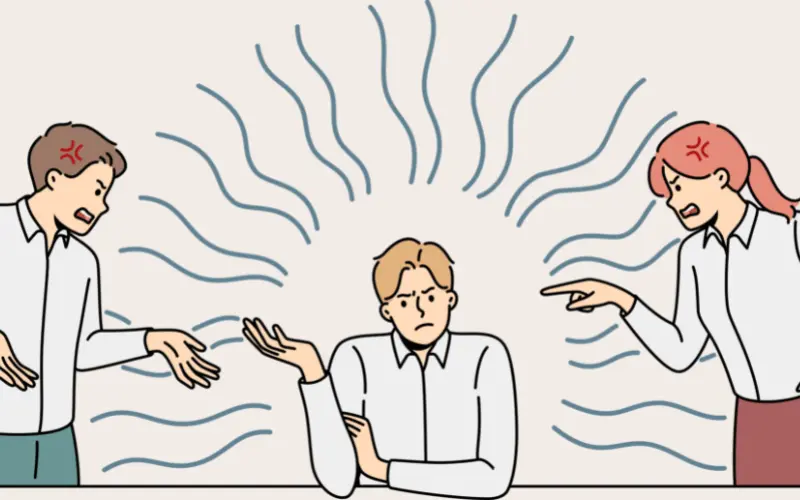Introduction
How to improve mental health?
This question has baffled scientists for a long time. But now we are getting closer to the answer.
The answer is ‘SLEEP’.
Back when I was in high school, I made a challenge with my best friend.
If we could go seven days without any sleep, the winner would do the other’s homework for the rest of the month.
We failed ridiculously.
And I thank God for that.
I was going nuts and could not concentrate on anything, and my school work and family responsibilities went haywire.
That is when I understood the importance of sound sleep and mental health.
What is Mental Health?
According to World Health Organization–
“An individual can form a harmonious relationship with others and to participate in or contribute constructively to changes in a social environment.”
In short, having good mental health provides you with the possibility of being flexible and judge a situation through various perspectives.
Why Having a Sound Mental Health is Important?
A person’s mental health affects two aspects of life-
- Individual Aspect: Having Sound Mental health is important because that person is generally happy, confident and has high self-esteem that helps him reaching optimum success in life. He is devoid of frustration. Above all, he does not compare himself with others. He is a harmonious person that everyone admires.
- Social Aspect: Humans are born in a society and, in general, is a social being. Environment plays a crucial part in a person’s character formation. Customs, cultures and traditions also influence the mental health of a person. A child, while growing up, goes to school, learns values and mingles with friends shapes his mental well-being.
But even there are times when the individual fails to cleanse his mental health. Society fails to provide a person with sound mental health. It happens due to ignorance and audacity to overrule the Natural rhythm in this fast-paced life.
What is the Human Circadian Rhythm?
Our bodies are a complicated machine that has its clock. It decides when to work and who to rest.
There are four biological rhythms present in the human body, and Circadian Cycle is one of them.
If we look at basic human physiology, the sensory organ through which we see the beautiful world contains two types of cells.
These cells ( rod and cone cells) responds differently to different stimuli.
They look at the environment and indicates when it is light or dark and whether you should sleep or not. During circadian rhythm, bodily hormones such as melatonin and cortisol get activated too. They are responsible for your sleep-wake cycle.
A baby usually needs more than 17 hours of sleep in his circadian cycle. An elderly might need only 6 to 7 hours of sleep.
The optimum level of circadian sleep in an adult is 8 to 9 hours, or his mental health will suffer.
How to Improve Mental Health with Circadian Rhythm
Accept it or not, we have turned into Netflix binging night owls with poor quality of morning sleep because we have to go to work, right?
The causes of disruption of a healthy rhythm are given below:
- As mentioned earlier, too much screentime before sleeping. Modern gadget screens make your eyes so dry that a single drop of tear barely comes out. The eyes need to be lubricated or slippery for eyelids to close. Your smartphone is not helping with that.
- Poor intake of nutritious vegetables.
- Sometimes night shift jobs.
- You are under an extreme amount of stress or having underlying anxiety.
- You are taking too much caffeine before sleep.
- Alcohol or other substance abuse.
- An organic cause such as brain injury,
- Jet lag (flying in different time zones.
What Are the Difficulties in Sleeping?
Before we delve deeper into modern-day sleep problems, we need to know about a human being’s usual sleeping patterns.
The sleep cycle is divided into two types of sleep,
- NREM or Non-Eye Movement Sleep
It is divided into four major parts.
When you lie down or awake and doing a non-stressful regular activity, your brain imparts alpha waves or mixed waves.
The onset of sleep can be indicated by the absence of alpha waves.
Your sleep is lightest at stage 1 NREM sleep. At that point, your brain starts imparting theta waves.
Within a few minutes, you fall into a deeper stage of NREM 2 and sigma waves are prominent.
Stage 3 and 4 NREM are almost similar as they show high voltage sigma wave activity, which means you are in a deep sleep very hard to wake you up.
- REM or Regular Eye Movement Sleep
At the end of NREM sleep, the REM stage arrives. It is a relatively light stage of the sleep cycle. In the REM stage, you see most of your dreams because of the rapid movement of your eyes. In this stage, a strange thing happens. Though it is a light sleep stage, waking up from this is very hard as your mind is active. But your body is not.
Often sleep paralysis occurs during REM sleep.
These stages keep circling at regular intervals throughout the night. For example, the onset of REM sleep is 90 minutes after the first NREM stage.
Insomnia and its Consequences
Do you have trouble falling asleep at night?
A daily dose of Valium cannot sort out the problem?
Then, my friend, you probably have Insomnia, a common sleep disorder.
The symptoms of Insomnia are:
- Difficulty in going off to sleep.
- It is difficult for you to remain asleep.
- You face early morning wake up.
- You feel fatigued after waking up.
- No matter how many small naps you try to take during the daytime, your tiredness does not go away.
- You are worried about not being able to fall asleep before going to sleep.
- Eventually, depression or anxiety follows.
Hypersomnia and its Consequences
Are you sleeping too much?
No matter how much you try to limit your sleep period, you fall into the slumber of sleep?
Then you might have Hypersomnia, another sleep disorder.
The symptoms of Hypersomnia are:
- You feel excessively sleepy during day time.
- Sudden attacks of sleep “attack” which you cannot control, even though you slept for long hours at night.
- You feel disoriented and need quite an amount of time from that sleep haze. This phenomenon is knowns as “sleep drunkenness”.
- Hypersomnia can cause mental and physical health issues like narcolepsy, cataplexy or sleep apnoea.
How to Improve Mental Health
For the sake of your mental health, you must take care of your sleeping habits. There are ways which you can initiate on your own. They are:
- Maintain a regular time of the sleep-waking cycle.
- Limit the time of the screen before going to sleep.
- Do regular exercise in the morning but preferably not in the evening as it keeps you hyper-vigilant.
- Quit frequent daytime naps.
- Keep your dinner light and not too heavy.
- Avoid intake of caffeine or fizzy drinks before sleep.
- Do NOT use alcohol as a ‘remedy for Insomnia.
- Cut off daily smoking.
- Keep your AC or fan on and keep the room dark and devoid of any distractions.
- If you want a nice sleep, then you can also try slow breathing exercises before bedtime.
- Last, but not least, do not forget to stay hydrated!
When to See A Doctor?
Major lifestyle changes can hinder your sleeping abilities and cause significant mental distress. So, it’s better to consider a mental health professional.
Often you might have underlying anxiety that can cause sleep problems therefore, a counsellor can help you identify your faulty thoughts. Remember, it is a disorder when sleep problems start affecting your professional, academic or social life.
Do NOT self medicate!
Conclusion
In this fast-paced life, we are living under ever-changing technology. The presence of sleep disorders is quite common.
You might want to win the best employee award at your company by taking on more work than others, but you have to be conscious of how it might affect your mental health.
A good night’s sleep restores your mental strength.
It restores your memory and ability to make logical decisions.
Sleep protects you from harmful physical as well as mental ailments.
So, before staying up till 2 AM watching crime dramas, think, is it worth sacrificing my mental health for?
Be the change you wish to see in this world.











